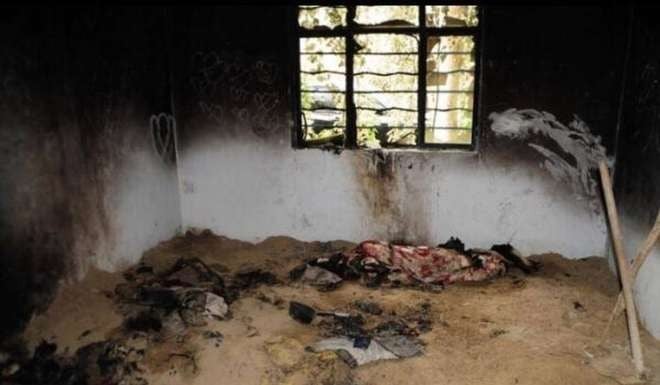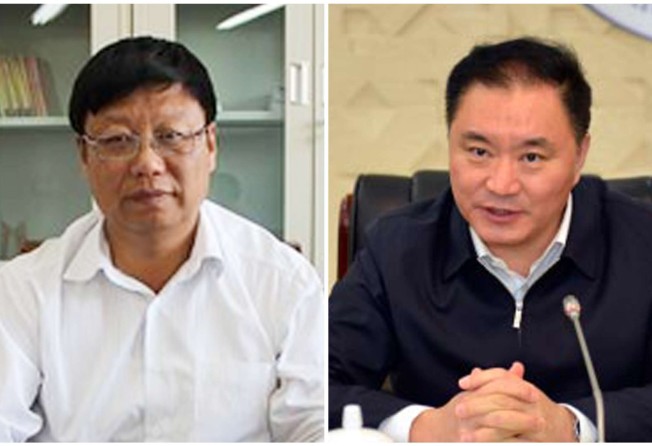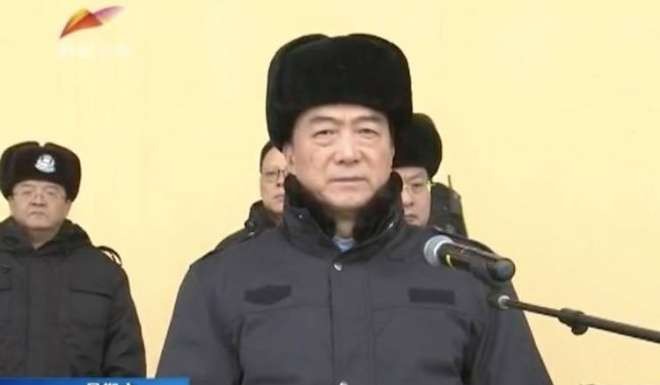
China probes senior Xinjiang party officials days after deadly bomb attack
Party chiefs of Hotan prefecture and Karakax county both suspected of ‘serious disciplinary breaches’ and ‘dereliction’

Two Communist Party officials in Xinjiang have been placed under investigation for corruption and dereliction of duty, just days after a deadly attack occurred on their watch, according to mainland media reports.
The Xinjiang Discipline Inspection Commission said Zhang Jinbiao, 53, the party secretary of Hotan prefecture in southern Xinjiang, was under investigation for “serious disciplinary breaches” – a common euphemism for corruption.
Zhang was also implicated in “dereliction”, a rare charge for officials under initial investigation.
In another online statement, the commission said He Jun, party chief of Karakax county under Hotan prefecture, had also been placed under investigation for suspected “disciplinary breaches” and “dereliction”.
The investigation came just days after a suicide attack rocked an office building in Karakax county.

During the attack, which occurred on Wednesday last week, police shot and killed the three assailants, who were wielding knives and managed to detonate a home-made explosive, Xinhua reported. An official and a security worker were also killed and three other people wounded.
While it is not clear what triggered the officials’ downfall, the two are likely to become the third and fourth officials in the region to be sacked after attacks in their jurisdiction since September.
Official reports had earlier said that both Pishan county’s party boss and county chief were replaced in September.
The reshuffle came immediately after an attack in the county, according to two sources familiar with the matter.
Pishan county is also part of Hotan prefecture, one of the districts in the region that have experienced the most attacks.
The practice of sacking officials immediately after attacks had been adopted by the region’s new party chief since August, Chen Quanguo, the sources said.

Chen, 61, is considered a front runner for the new Politburo to be formed later this year. His two predecessors both entered the top decision-making body after being named party chief of the region.
“Chen is looking to enter the Politburo and had told cadres that no accidents were allowed,” a source close to Xinjiang authorities said. “But he had never visited southern Xinjiang himself.”
Unlike the north, the south of the region has seen a very limited influx of ethnic Han residents, and had been the area most targeted for attacks. Southern Xinjiang has remained underdeveloped and is also where most attackers are originally from.
The practice of replacing officials after attacks could undermine the ability to govern Xinjiang, a long-time observer of the region in Beijing said.
“It’s not that anyone from the outside knows how to govern those counties. A lot of the officials are already undergoing tremendous pressure fighting terrorism,” said the analyst, who requested anonymity because the matter is sensitive.
Unlike most parts of China, Xinjiang is predominantly populated by ethnic Uygurs, who are primarily Muslim. Tensions in the region have been high in recent years, during which deadly attacks were launched against civilians, police and office buildings.
Beijing blames the unrest on the East Turkestan Islamic Movement, which seeks independence for the region, but many analysts doubt whether the group even exists as a cohesive militant unit.
Militants from Xinjiang have also joined Islamic State, according to officials.